Marine Corps Cpl. Kavin Dang uses an air tank regulator during helicopter underwater egress training at Camp Lejeune, N.C., March 23, 2021.
Providing up-to-date information, news and original content on American Military issues.
Marine Corps Cpl. Kavin Dang uses an air tank regulator during helicopter underwater egress training at Camp Lejeune, N.C., March 23, 2021.
Army Spc. Alex Hammack, a California National Guardsman, hurdles an obstacle during a competition at Camp San Luis Obispo, Calif., March 30, 2021.
A member of the Defense POW/MIA Accounting salutes during a disinterment ceremony at the National Memorial Cemetery of the Pacific in Honolulu, March 29, 2020. The ceremony was part of the agency’s efforts to disinter the remains of unknown service members lost during the Korean War.
Marines hammer stakes into the ground during a weapons and tactics instructor course near Yuma, Ariz, March 16, 2021.
Air Force Senior Airman Brittney Norwood, a medical technician from Langley Air Force Base, Va., administers a COVID-19 vaccine to a resident at the North Carolina Community Vaccination Center in Greensboro, N.C., March 26, 2021.
April 1, 2021 | BY Staff Sgt. Caitlin Brink , Marine Corps Air Station Cherry Point
The bonds built between Marines are said to help people grow personally and professionally as they mold who they are as individuals, and as part of something bigger than themselves. This is especially so for military working dog handlers and their K-9 partners, making it extraordinarily thrilling when a team is reunited forevermore.
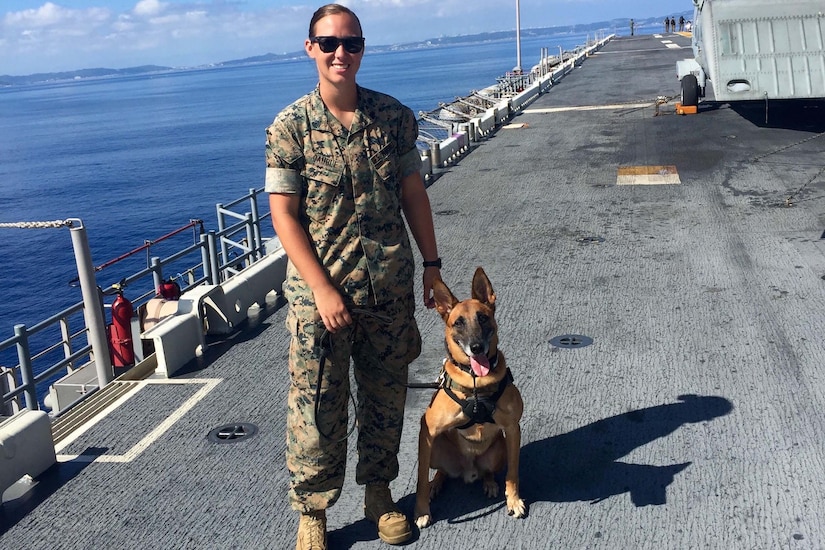
I joined the Marine Corps in 2013; I did not know military working dog handler, or K-9, was a career field option until I saw a military policeman with a dog and asked, "How do I do that?" He told me to come to the on-the-job training on my off days. I was selected for a school seat after months of OJT.
Retired Military Working Dog Bbutler P283 (Tattoo Number).
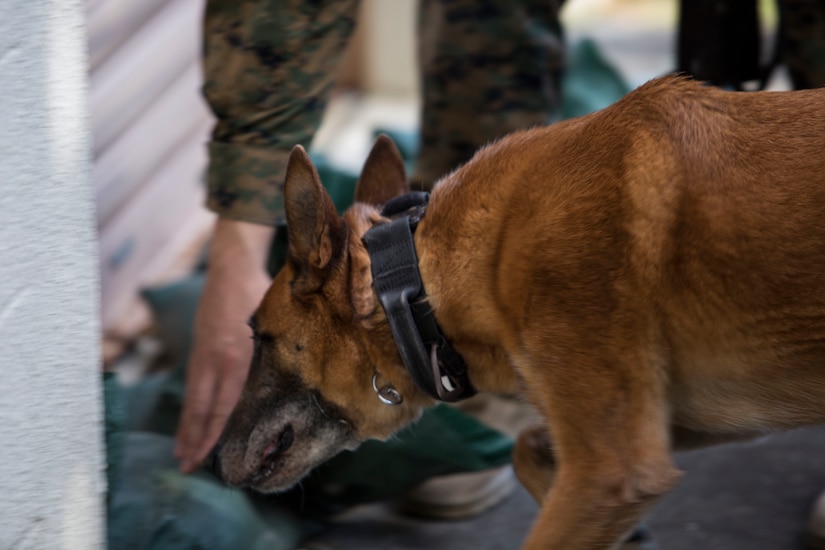
Bbutler was the first dog I ever handled in the Marine Corps. I was assigned three more military working dogs after him. I am not sure of the exact amount of handlers he had before or after me.
I was assigned Bbutler in 2015 when he was 6 years old.
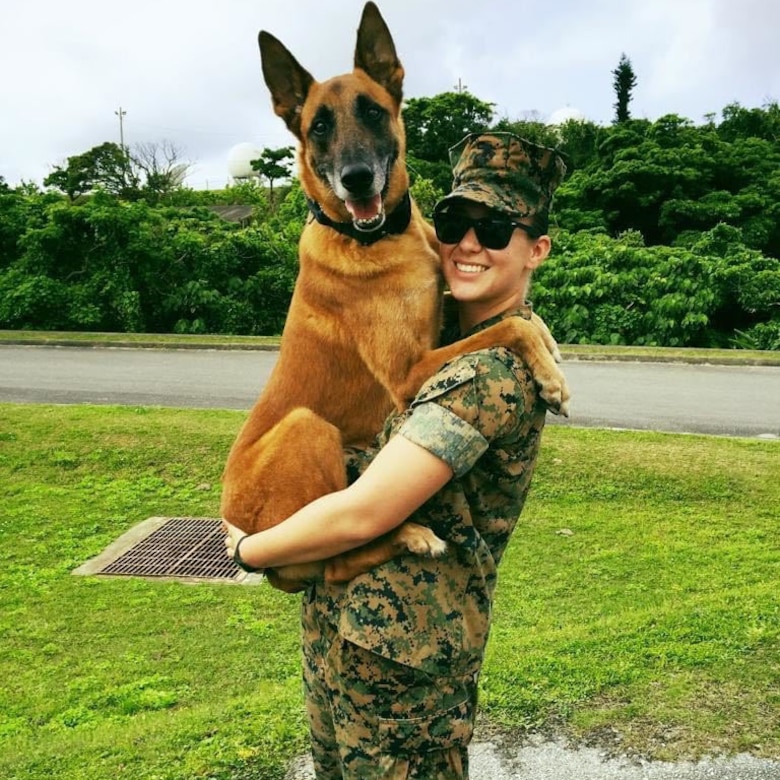
The military working dogs are great partners and assets to protecting military bases as well as worldwide support in a conflict of war. These dogs serve to save lives, and they deserve to be remembered as well as enjoy their retirement. These dogs live for the work and do not know how to be just a dog, some dedicate their whole lives to the military and some are broken in the process. So when we as handlers are afforded the opportunity to adopt our prior MWDs it is a very incredible experience because we want nothing more but to honor them and the service that they dedicated their life too.
When we were newly assigned as a team I felt like we bonded immediately. We built a strong rapport that turned into a lifelong friendship.
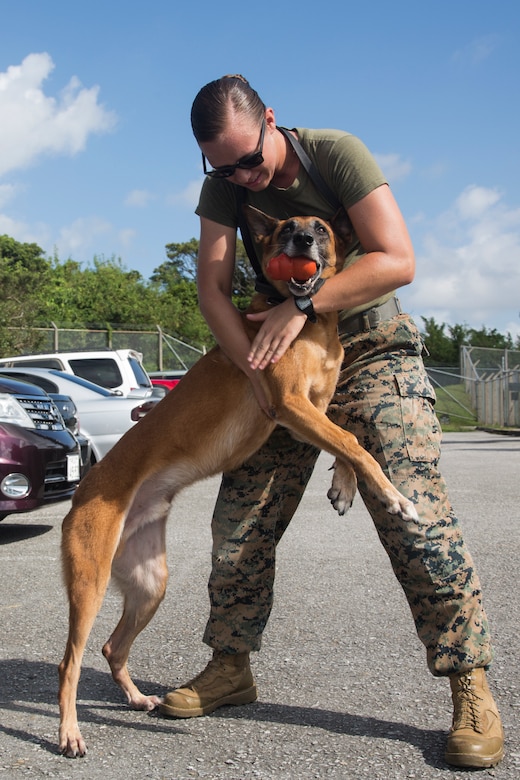
We served together from the end of 2015 to July 2017 in Okinawa, Japan.
We had numerous calls and finds together as a dog team. Our adventures exploring the island included finding waterfalls near the kennels as well as countless trips to the beach. We have met multiple famous individuals who mostly wanted to "pet my dog" and so many demonstrations for the local community. We pretty much were the demo dog team considering Bbutler was awesome at patrol work. My most memorable time working together was flying in a helicopter which was a first experience for both of us. We flew on the bird for about two hours to land on the [Marine Expeditionary Unit] which we had to search the [Bonhomme Richard] and stay on it until it ported.
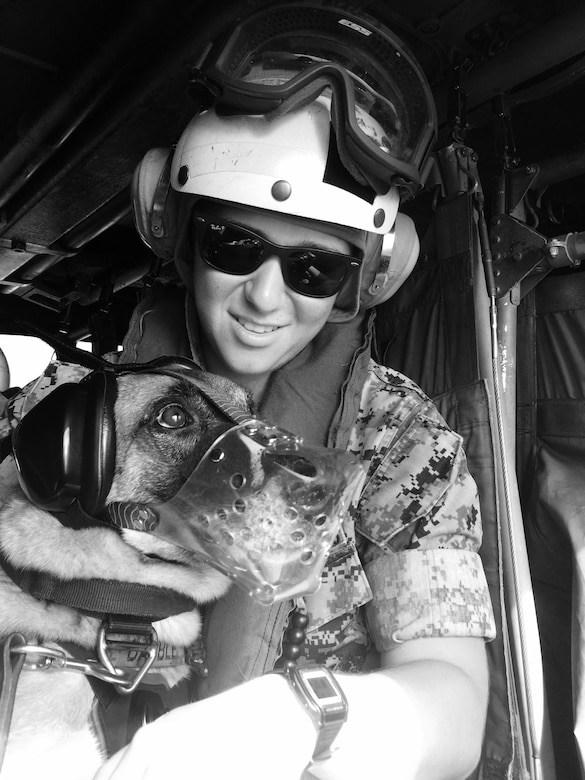
Working with Bbutler was my highlight in Okinawa. Not having a car or family really helped us connect. Even on my off days, I would go to the kennels just to hang out with him. Having this dog that was my responsibility made me want to be a better Marine. I had more to lose than other Marines, and I wanted to not only treat him as a partner but as a friend.
When I left Okinawa, I left my adoption papers for when the time came for him to retire. Once I heard he was retiring in May of 2020, I was excited. His health is degrading and he is not the same energetic dog anymore but I would constantly receive pictures keeping me posted with his well-being.
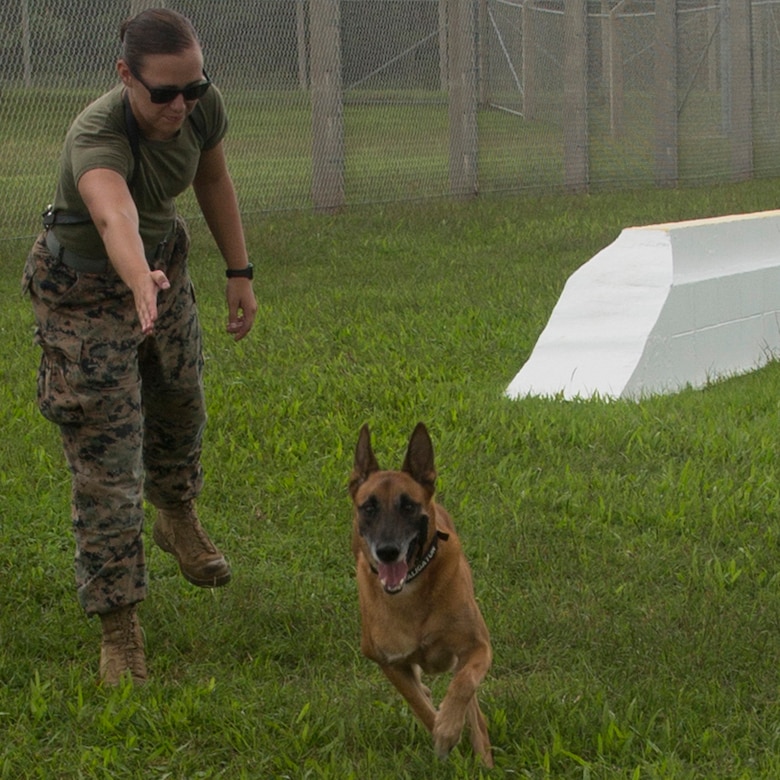
There were some issues getting him back to the states. With his health it was pretty much impossible for him to fly cargo. Bbutler needed an escort on that long journey to have his medication administered. He has an autoimmune disease and I got the dreadful phone call that he was going to need a blood transfusion. He pulled through, and then the COVID-19 pandemic hit and the restrictions were at an all-time high. I got very discouraged that I might not ever see him again. A non-profit organization strictly for reuniting handlers with dogs was able to help. They got Bbutler back to the states and drove him personally across the country to my house here in Havelock, N.C.
The non-profit organization drove him to my house. I remember pacing around and actually pretty nervous. I did not know if he would remember me and it had been four years since I had seen him. Last time I saw him his health was perfect and to know he is sick broke my heart. It was a very overwhelming experience. I felt like I was trying to over prepare for a senior dog. I wanted him to be as comfortable as possible.
When he got out of the van he ran right up to me. I felt like we instantly reconnected. Seeing him in the condition he was in from being old and sick is heartbreaking but I know I will give him the best remaining time he has left here with me.
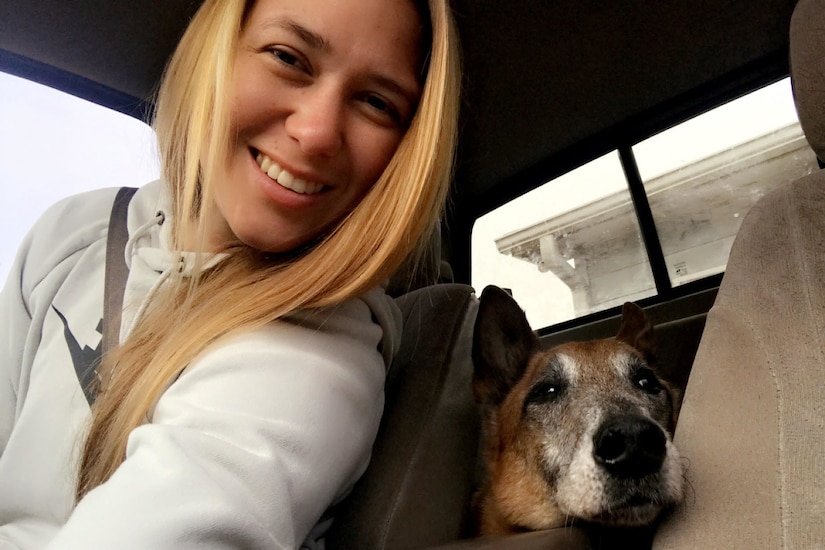
One of the main things I want to do with Bbutler is take him to Arlington, Virginia, to see the newly built women K-9 handler monument at the Arlington National Cemetery; it is to honor military women and service dogs. Retirement is pretty great for him so far, he is with me all the time. We have been out exploring different places, to include almost every pet store. He gets all the treats, lays on the couch, and lots of cuddling. He recently just celebrated his 12th birthday which was filled with a day of spoiling him.
The bond between my RMWD and myself is hard to explain. He is my best friend and a part of my family. He was there for me in Okinawa and now I want to pay that back to [give him] the best life possible for him in his remaining years on this earth.
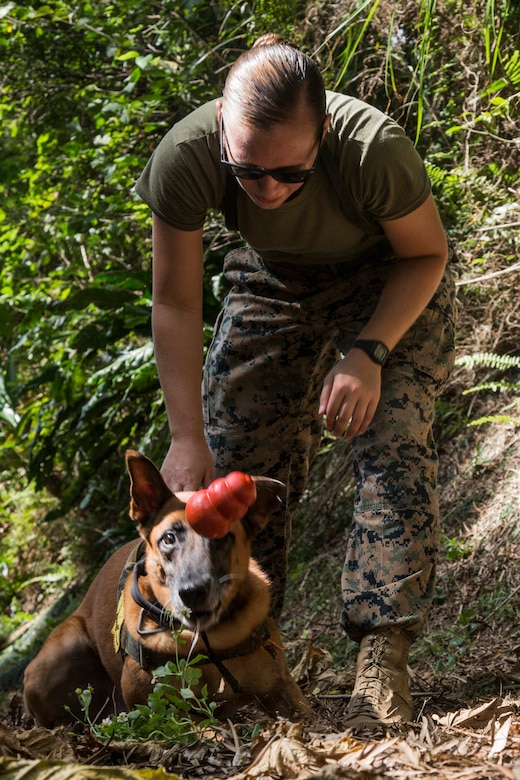
Having been a handler most of my career, there is something special
about your first dog. You never realize how the bond between you and
your K-9 would impact you. For me, I always thought about him and kept
him close to my heart since I left Japan in 2017. I hoped I would see
him again and be able to give him a good life. Even though he is sick,
he still has a lot of life to live. He is the happiest I have ever seen
him and those memories we have together when we were both younger I will
cherish forever. Handlers being able to adopt these dogs, especially
the ones overseas, is the best thing for this small K-9 community.
Army Spc. Hezekiah J. Pacheco, a combat medical specialist with Task Force Kauai, Hawaii National Guard Joint Task Force, administers the COVID-19 vaccine to eligible Kauai residents at the Kauai War Memorial Convention Hall in Kauai, Hawaii, March 25, 2021.
April 1, 2021
PRESS SECRETARY JOHN F. KIRBY: Hello, everybody. How are you? OK, I do have a fairly lengthy beginning here because I have three phone calls to read out to you, so -- did you just sigh? You sighed, didn't you?
Q: Yeah, I did. Want me to do it again?
(Laughter.)
MR. KIRBY: No, actually, I don't.
(CROSSTALK)
MR. KIRBY: As I said, I -- I do have some -- some phone conversations to read out to you. I will release these in text, as well, after the gaggle.
But this morning, Secretary of Defense Austin spoke by phone with his Ukrainian counterpart, Ukrainian Ministry of Defense Andriy Taran, to discuss the regional security situation. The secretary reaffirmed unwavering U.S. support for Ukraine's sovereignty, territorial integrity and Euro-Atlantic aspirations. He condemned recent escalations of Russian aggressive and provocative actions in eastern Ukraine, and he offered condolences to the minister on the deaths of four Ukrainian soldiers on the 26th of March.
He also reiterated the U.S. commitment to building the capacity of Ukraine's forces to defend more effectively against Russian aggression. I think it's important remind that since 2014, the United States has committed more than $2 billion in security assistance to Ukraine, including a recently-announced $125-million package that featured defensive weapons and other key capabilities to enhance the lethality, command-and-control and situational awareness of Ukraine's armed forces. Minister Taran expressed his gratitude for the open dialogue and continued support.
He also spoke by phone this morning with his Turkish counterpart, the Turkish Minister of National Defense, Hulusui Akar, and -- I'm sorry, Hulusi Akar -- to underscore commitment to the U.S.-Turkish bilateral defense relationship and collective security through NATO. The secretary thanked the minister for the significant role that Turkey is playing as part of the Resolute Support Mission in Afghanistan and in support of the ongoing peace process.
The two leaders also discussed the positive diplomatic developments and efforts to reduce all tensions in the eastern Mediterranean, where the secretary welcomed ongoing exploratory talks between NATO allies Turkey and Greece, and the commitment of both governments to this process.
The secretary also highlighted cooperation among allies and partners in the Black Sea, including recent exercises that included the USS Monterey and USS Thomas Hudner, as well as Turkish naval assets. Secretary Austin and Minister Akar discussed the instability along NATO's eastern and southern flanks, including challenges posed by Russia. The secretary noted the importance of working to strengthen U.S.-Turkey military-to-military cooperation and urged Turkey not to retain the Russian S-400 Missile Defense System.
Secretary Austin also spoke by phone this morning with his Greek counterpart, Greek Minister of Defense Nikos Panagiotopoulos to reaffirm the strong and deepening security partnership between the United States and Greece. He offered congratulations to the minister on the bicentennial of Greece's independence, which they celebrated on the 25th of March, and he thanked the minister for hosting U.S. forces -- bless you -- thanked the minister for hosting U.S. forces at Souda Bay in Crete. He expressed a specific appreciation for Greek prime -- the Greek prime minister's visit to the USS Eisenhower when she was in port there on the 23rd of March.
The secretary highlighted our strong bilateral defense cooperation marked by an expansion of the presence of the United States in Greece during the past year, with the home porting of the USS Hershel "Woody" Williams, an expeditionary mobile base at Souda Bay.
Bless you. You OK, Dan?
(Laughter.)
Secretary Austin noted that our deepening relationship is a dividend of the 2019 update of the U.S.-Greece Mutual Defense Cooperation Agreement. The two leaders also discussed the positive diplomatic developments in efforts to reduce all tensions in the eastern Mediterranean, where the secretary welcomed ongoing exploratory talks between NATO allies, Greece and Turkey, and the commitment of both governments to this process. The leaders committed to being vigilant regarding threats to stability in NATO's southern flank, including from Russia -- Russian malign influence.
The secretary noted Greece's consistently -- I'm sorry. Let me start that one again. Secretary Austin noted that Greece consistently exceeds NATO defense spending goals, which is a vital assessment -- investment to maintain a strong alliance. He mentioned the long-standing strategic relationship between our two militaries afforded by Greek investments in U.S. defense systems, and noted the Hellenic Navy's Frigate Modernization Program would be a generational opportunity to expand our naval partnership.
And with that, we'll take questions. Ms. Baldor?
Q: Mr. Kirby. One follow-up.
MR. KIRBY: I noticed you weren't taking notes, Lita.
Q: Maybe I will now. A follow-up on the call. What was the response to the secretary urging that Turkey not maintain the S-400? And my question is -- my second question is, is the U.S. pulling all or some of the Patriot missile batteries out of Saudi Arabia? Can you update us on whether the carrier is going to be withheld or whether it's going to go into the Middle East? And will there be any of the missile batteries maintained in Saudi Arabia, or is the decision to pull them all out?
MR. KIRBY: Boy, there's a lot there. I won't get into more specifics about the conversation with his Turkish counterpart, as I said. I can't -- I -- I can only speak for our side, and the secretary reiterated our opposition to the acquisition of the S-400 system in -- in Turkey as completely incompatible, of course, with -- with the F-35 program. And I would let the -- the Turkish side speak to -- to their reaction to that. But -- but his -- his focus was on reiterating our -- our objection to the acquisition of and -- and -- and delivery of that system.
And you had so many others. Let me see if I can get through them.
Q: (Inaudible).
MR. KIRBY: Yeah, yeah. So look, I mean, I -- I think you guys recognize that the -- the staff here that works for the secretary, as well as the Joint Staff continually work with the combatant commanders to -- to help the secretary develop his best advice to the commander-in-chief about where we operate, what resources we have, what priorities we're trying to -- to meet and -- and the strategy ends that we're trying to achieve around the world. Without speaking to specific capabilities in any one country, I would tell you, we continue to take a strategic approach to the allocation of -- of our forces. And we routinely, as you know, make changes in that allocation for a wide number of -- of factors.
Now, as for Saudi Arabia, we continue to support the defense of Saudi Arabia in partnership with the Saudi military, including their abilities to counter inbound threats. And of course, we call on the Houthis to cease these attacks and to work to achieve a -- a political solution. I am -- am not going to get into specific capabilities that are in specific places, and for how long they will be. I -- I think I need to just leave it at that.
Q: Well, a quick follow-up: As you're aware, a lot of these efforts were added and shifted - particularly the Patriot missile batteries were shifted a little over a year ago in response to the threat from Iran, as well as the ongoing Houthi threats.
Does the administration and does the Secretary believe that the Iranian threat has reduced to the - to the extent that there is no longer a need for that level of defense in that region?
MR. KIRBY: Again, without getting into a qualitative intelligence assessment about the threat that - specifically about the threat that Iran poses, we recognize that Iran still poses a threat to its neighbors in the region and to our national security interests in the region.
Their ballistic missile program still exists and - and has improved. Their continued support for terrorist groups in the region still is a problem and has, in many ways, accelerated. So they continue to pose a - a threat to our interests and to the interests of our allies and partners in that part of the world and we take that very seriously.
Q: Could I very quickly follow up on that?
MR. KIRBY: Sure.
Q: The President said that, you know, they were no longer offering offensive capabilities to the Saudis in the war against Yemen ...
MR. KIRBY: Correct.
Q: ... but would maintain defensive capabilities. So doesn't this undercut that pledge?
MR. KIRBY: Well, it - the - the - the question presumes that I'm going to confirm a press reporting. So I - I appreciate that - the - the - the question but I'm not going to do that, I'm not going to speak to specific capabilities in any one country, particularly in that part of the world.
We do take seriously our commitments to the defense of Saudi Arabia, and they are under attack, there's no question about that. I mean, you guys see that almost every day. And the Secretary obviously takes that seriously and he expressed that when he talked to the Crown Prince several weeks ago.
So again, without speaking to specific capabilities and where it is or how long it's there, we absolutely take very seriously our commitments to helping the Saudi Arabian people defend themselves against these - these attacks, which unfortunately still continue. Barbara?
Q: Going back to the Secretary's phone call with his Ukraine counterpart, you said that the Secretary condemned the recent Russian actions. Two questions - can you be a little more specific one more time about what he is condemning? And if he's condemning the Russians, does he believe their most recent statements today, including from Dmitry Peskov, that everything they're doing is just fine, that nobody needs to worry about what they're doing, there's no hostility intent, does he believe them and why would he?
MR. KIRBY: Well as I said in my opening - and it'll be in the readout - we're condemning the recent escalations on - in Eastern Ukraine. And of course that's round up in the deaths of these four Ukrainian soldiers recently. That's the specific that - in - in terms of the - the condemning.
As I said yesterday, I mean, we're monitoring the situation with respect to Ukrainian military reports of Russian military placements and forces along the border. We're - these are Ukrainian military reports. We're monitoring that very, very closely and we certainly call on the Russians to be more transparent about what this is about but we've learned from bitter history not to just take at face value Russian claims of their intentions.
Lara?
Q: Hey, thanks for doing this. The President last week - is - during
his briefing said that he had not yet been briefed on Secretary Austin's
trip to Afghanistan. At this point, can you confirm that the Secretary
has briefed the President on the trip?
MR. KIRBY: I will not make a habit of discussing the Secretary's private conversations and advice to the Commander in Chief.
Q: At this point, it's been a week and a half. So - or, I mean, it would be great if you could ...
MR. KIRBY: I'm sure that it would be great if I could, but no, I - I - I ...
(CROSSTALK)
... it's not a - it - it - it just is - I'm not going to make a practice of advising the Secretary's personal conversations with the Commander in Chief and the advice that he's giving him.
Dan?
Q: Going back to this discussion about resources in Saudi Arabia and the Middle East, you've talked about China as the main challenge, and there's been a lot of voices in and outside the Pentagon, as you know, that have said the U.S. has moved too slowly to recognize the threat posed by China and still has too many resources tied up in the Middle East, including ISR, ships, even Patriot batteries, for example.
So is this - is - is what's going on now, what we're seeing, some kind of a beginning of - of, you know, a - a - a rebalance, a shift to Asia, or is that something you're discussing?
MR. KIRBY: Well again, I'm not going to confirm items in a press report but, Dan, I mean, it should be lost on nobody that the Secretary's first overseas trip was to the Indo-Pacific region and to meet with allies and partners - Japan, South Korea, India - about their perspectives on the tensions in that part of the world, tensions which are, in many ways, being propelled by China's aggressive activities and their excessive maritime claims and - and military modernization. No question about that.
He has a Global Force Posture Review ongoing right now, which we expect will wrap up in the summertime, and - and that will greatly inform him going forward as to what resources need to be allocated in all - around the world and what strategy we're trying to achieve.
And I think that's where the Secretary's head really is, is - is in terms of making sure that - that the - the force posture review is - is done completely and thoroughly with a global view about where we have troops, where we have assets, where we have systems and do we have the right strategies in place for the threats and challenges in those - in those - in those places around the world?
Q: ... thinks the phone line is back.
MR. KIRBY: We do?
(CROSSTALK)
Q: Luis thinks it's back.
(CROSSTALK)
MR. KIRBY: Go ahead, David.
Q: Thanks.
MR. KIRBY: Thank you.
Q: ... I - I - I walked in late when you were reading, I guess, the - the statement about his - his - his call with the Ukrainian Defense Minister. Does he have plans to call the Russian Defense Minister?
MR. KIRBY: I - I don't have any calls to announce today. Oh, I guess I should go to the phone. Tara? Give it a second. I know you have to, like, unmute twice or something, right? OK, Tara, we'll come back to you.
Phil Stewart, you there?
Q: OK, I'm here now, sorry about that.
MR. KIRBY: That always happens every time I go to the next caller.
Go ahead, Tara.
Q: Yeah, we're just messing with you.
(Laughter.)
Q: I -- I'm wondering whether you can confirm that Camp Roberts in California is going to be used as an additional HHS site to house migrant children. There's local news reporting that that has happened and the preparations are underway to get the base ready. And apologies if you said this at the top, a -- a bunch of us were having issues getting in.
MR. KIRBY: The technical issues? I did not talk about this yet. I can confirm that we have received a request for assistance from HHS for the potential use of Camp Roberts in California to house unaccompanied minors. I would let HHS -- as I have done consistently -- speak to the details of their request. But we are moving forward with analyzing that request for assistance right now.
Q: Can you confirm that it would be for approximately 1,500 migrant children? And do you anticipate that additional bases are going to be sought since the numbers coming across the border seem to be a lot bigger than anyone anticipated?
MR. KIRBY: I'm not going to confirm the number, Tara. I know that's a -- a very fair and legitimate question, but it's really one better posed to HHS. We're -- we make it a habit not to detail the specifics of -- of an RFA, a request for assistance. And we'd let -- we'd ask you to ask HHS about the specific numbers they're looking at.
But we do have the request in the building. We are analyzing it, as we have the others. And as soon as we have something definitive to tell you in terms of where -- were we sit on our analysis of it, I'll -- I'll -- I'll do that.
And I'm sorry, you had another question? Oh, about whether there's other ones. I know of no other potential requests for assistance that -- that we're waiting for or that we anticipate. But clearly, we're in constant communication with HHS. And you know, if they desire to request additional use of DOD installations, we will certainly entertain those requests going forward, as we have in the past and as we're doing presently. Okay --
Q: All right.
MR. KIRBY: Phil? Okay.
Q: Hey, John. Thanks --
Q: (OFF-MIC)
(Laughter.)
Q: (OFF-MIC) What happened to Phil?
MR. KIRBY: Goodbye, Phil. (Laughter.) All right, we'll get back to Phil.
(Ma'am ?)?
Q: So there were some satellite images of the Yongbyon plant in North Korea showing some activity. I was wondering if the Department's monitoring that and if you're concerned about activities there.
MR. KIRBY: We don't discuss intelligence matters.
Sir?
Q: Paul Handley from AFP. Sorry for coming in late. You keep saying that the assessments of what's going on in the Ukraine with Soviet forces depends on what the Ukrainian government is telling you, rather than saying this is -- you know, the U.S.'s own intelligence. So is -- what are they telling you and is it reliable?
MR. KIRBY: I did not say that. I did not put it the way you put it. I sad we are -- I said we are monitoring -- we are aware of Ukrainian military reports of Russian military actions along the border and we're monitoring that very closely --
(CROSSTALK)
Q: Ukrainian military reports, do you have doubts about they are -- what -- what they say?
MR. KIRBY: I said we are aware of military reports and we're monitoring it very closely.
Q: Are they reliable?
MR. KIRBY: I'm not going to get into intelligence assessments here, sir. I'm not going to do that.
Q: And a -- one follow-up, is the status of European Command forces the same as it was yesterday when you said they're --
(CROSSTALK)
MR. KIRBY: We don't talk about -- we don't talk about threat condition levels for any combatant commander around the world. All our commanders have -- have it within their purview to adjust their force protection and their posture appropriately to the situation. And I won't talk to the specifics of that.
Q: But you confirmed yesterday that they were on watch?
MR. KIRBY: I did not, no, sir. In fact, I scrupulously did not confirm press reporting that there had been a change in WATCHCON. What I did do was describe for the press that were in attendance yesterday, what WATCHCON means, the purpose of it, but I did not confirm anything.
Q: Can I just follow up briefly? But you're going to some pains to avoid saying that the U.S. has any independent information. Why are you doing that?
MR. KIRBY: I'm not going to pains to confirm that, Barbara; I'm simply...
(CROSSTALK)
MR. KIRBY: ... I'm simply saying, as I have said many times, that we're not going to speak to specific intelligence issues. We're monitoring this very closely, we're monitoring this very closely.
Q: Is it fair to say if the secretary of defense of the United States is condemning something, he has good reason to...
(CROSSTALK)
MR. KIRBY: He was condemning actions in Eastern Ukraine. That's a separate issue than what we've talked about, what you guys have been asking about. We're monitoring this situation closely, and I think -- I think it goes without saying that when I say we're monitoring it, we're monitoring it. We -- we're watching this.
OK, thanks everybody.
U.S. Air Force F-22 Raptors from the 199th Fighter Squadron and Japan Air Self-Defense Force F-35A Lightning II aircraft from the 302nd Tactical Fighter Squadron fly alongside a USAF KC-135 Stratotanker from the 909th Air Refueling Squadron during fifth generation fighter training near Japan, Apr. 1, 2021.
Marines arrive in a Humvee for a two-week field exercise at Japan Ground Self-Defense Force Camp Nihonbara, Japan, March 23, 2020. The exercise allows troops to hone kills in setting up a forward operating base and forward arming and refueling point, and conducting mounted live-fire events.
Marines swim 250 meters during an assessment course at Marine Corps Base Camp Pendleton, Calif., March 29, 2021.